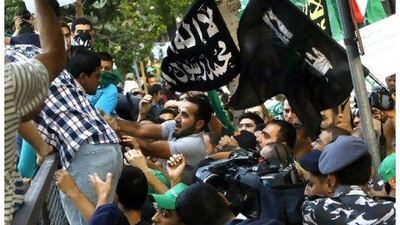BEIRUT //A core group of demonstrators clambered onto the statue at the centre of Beirut's Martyrs Square last week, waving Syrian and Lebanese flags and leading chants against the regime of President Bashar Al Assad.
"No to silence in Lebanon", read one banner held aloft among the few hundred people who turned out in the Lebanese capital for one of the city's largest protests against the continuing bloodshed in Syria.
While activists in Lebanon were stepping up their public criticism of the Syrian regime, the same could not be said for the Lebanese government, whose response to the violence in its neighbouring state has been largely muted.
At Monday's demonstration, protesters, including one man who would only identify himself as Bilal, expressed disappointment with their government's position.
"I am against the Syrian regime killing its own citizens," said the 20-year-old student from Beirut. "I am here from a humanitarian and a religious perspective and to be near our brothers and sisters in Syria. Syria is our neighbour and everything that happens there affects us here."
Although Syrian troops withdrew from Lebanon in 2005, ending a 29-year military presence in the country, Damascus still holds great political sway in the country.
There were growing concerns in Lebanon about the potential impact of the continuing violence in Syria. So far, several hundred refugees have fled into Lebanon's northern border region, isolated scuffles have taken place at demonstrations and the economy has been hit by the violence across the border.
The crisis was also proving troubling for the recently formed Lebanese cabinet. The prime minister, Nejib Miqati, this week reiterated his government's position that there should be no meddling in Syria's affairs.
"We cannot take sides in any internal problem in brotherly and friendly countries because then it would drag Lebanon into a bigger problem," he was quoted by local media as saying. "So why drag ourselves into problems that would shake our national stability?"
Mr Miqati's comments had come after Lebanon abstained from the UN Security Council's recent statement calling for an end to the violence in Syria. Next month, Lebanon, which currently sits as a non-permanent member, will take up the presidency of the council, possibly putting its position on Syria under greater scrutiny.
In contrast, diplomatic pressure has been growing as more countries condemn the Syrian government's crackdown on protests. This week, Saudi Arabia, Bahrain and Kuwait recalled their ambassadors from Damascus for "consultations", and the Arab League spoke out about the rising death toll, which estimates place at about 2,000.
Despite the mounting pressure from other Arab states, it is difficult for the Lebanese government to voice criticism of a regime with which it has such close ties, analysts say.
"The prime minister and the government have to find the best solution - to not be with the revolution, but at the same time to not be with the regime," said Talal Atrissi, a Lebanese political analyst.
Imad Salamey, a professor of political science at the Lebanese American University, went further, saying that the government owes its existence to Syrian support.
"So it's natural that the government's fate is well linked to that of the Syrian regime and it is destined to defend the Syrian regime," he said. "The collapse of the Syrian regime will mean the end of the Lebanese government."
The reaction of Hizbollah - whose allies dominate the Lebanese cabinet - has also come under the spotlight. The Shiite movement, one of Damascus' main allies, had been outspoken in its support of popular uprisings elsewhere in the region including Bahrain, Yemen and Egypt.
But, five months into the protests in Syria, the group has remained largely silent or echoed the Syrian government's stance that extremist groups are responsible for the deadly violence sweeping the country.
After the 2006 war with Israel, Hizbollah's popularity across the Arab world soared. Observers say the movement's reputation has now been eroded by its tacit support for the Syrian government.
Mr Atrissi believes Hizbollah's stance on the Syrian uprising is based on a two-decade relationship between the group and the Assad regime. But, perhaps more significant, is the strategic link between Hizbollah and Syria in the so-called "axis of resistance" against Israel.
"This is not a popular position for Hizbollah, but it has two choices - popularity in the Arab world or the future of the Syrian regime," Mr Atrissi said. "For them, the strategic choice for their role is the continuation of the regime."
Meanwhile, as the death toll rises from the Syrian government's crackdown, isolated protest have continued in Lebanon. After most of the demonstrators left Monday night's gathering in Beirut, the core group stood their ground, shouting towards around 50 pro-Assad supporters who had gathered outside the police cordon.
"Allah, Syria, Hurriyeh ou bas", they chanted (God, Syria, freedom and nothing else).
Across the other side of the street, supporters of the regime, some carrying portraits of Syrian president Bashar Al Assad, tried to drown them out with shouts of "Allah, Syria, Bashar ou bas".
zconstantine@thenational.ae

